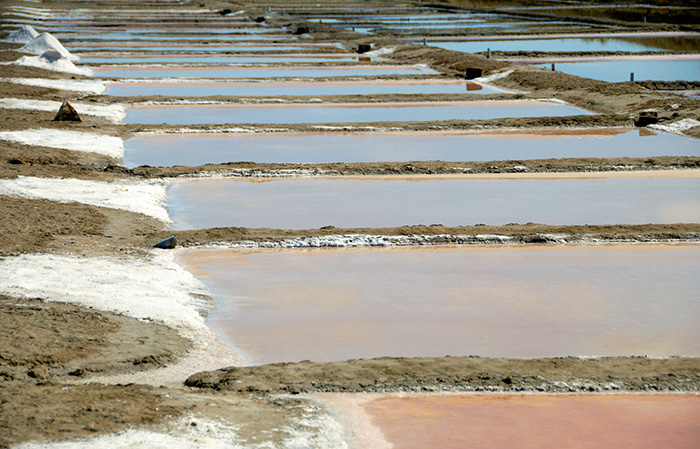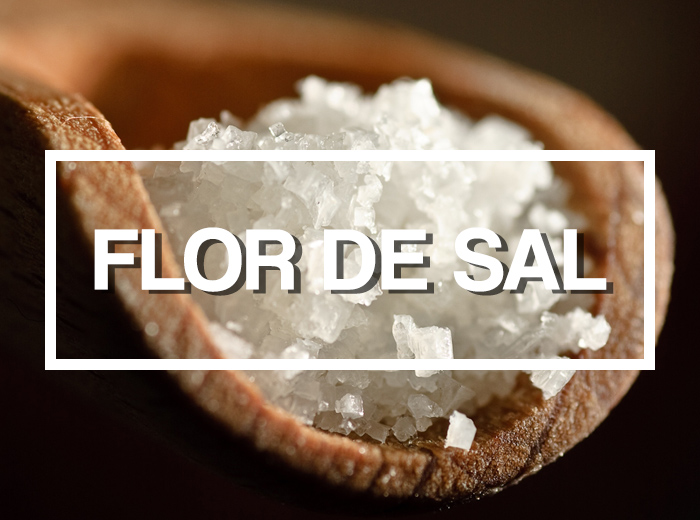Foto: Olivier Bataille | Creative Commons
In mid-2009, it fell like a bomb in the gastronomic environment that flower of sal had been prohibited by ANVISA (National Health Surveillance Agency) and importers could suffer fines and the like.
Before getting into this, do you know what it is? flower of sal?
Definition: Fleur de Sal
In French flower of salt: these are the surface crystals of salt collected in salt pans, in the more traditional ones it is done manually. The best-known regions are Guérande, Noirmoutier, Camargue (French) and Algarve (Portuguese), there are Brazilian versions as well.
They do not undergo any type of “heavy” processing or refinement. In gastronomy it is used to finish dishes, that is, it is not common to use it in large quantities. And of course, it’s not very cheap. It’s okay that in the producing regions there is everything with fleur de sel, as David Lebovitz said: Fleur de Sel.

Foto: Frederic Chanal | Creative Commons
The Iodine Law
In Brazil, the sal It is regulated by law nº 6150 of 12/03/1974 and by RDC nº130 of 05/26/2003 on the amount of iodine, mainly.
The law is completely clear, that is, it was not prohibited now. Was always. To begin with, could never have been commercialized. If it was done, an infraction was committed. That’s out of the question. Point.
I thought a lot before writing this article, as I’m sure I will be misunderstood by at least one person. However, I believe it is necessary to think outside the bubble that we live in in relation to gastronomy. Sometimes I feel that people have so much devotion and passion for the area that they forget to see the situation as something bigger, to take a more macro view of the fact.
Health and Public Policy
The decision to add iodine to salt had a very strong reason, thinking about health e Public politics of the population. It is necessary to analyze the context of when was made, in addition to the socio-economic conditions in the country.
According to the document of the V National Health Conference (1975), in the 1950s there was an incidence of 20.6% endemic goiter in the country. The most affected regions were the Central-West (53.8%), South (27.7%) and Southeast (27%).
It is near LATS (Latin American Thyroid Society), between the years 1974-1976, research was carried out with 421.752 schoolchildren (7-14 years old) and 41,1% presented goiter.
Goiter is the abnormal increase in thyroid, a gland that is located in the neck region. It can be caused by several factors, but the main one is a lack of iodine in the diet. Natural sources of iodine include Seafooddairy products and vegetables grown in iodine-rich soils.
We forget that a large part of the population do not have access to a balanced diet what it could supply the amount of iodine. A country of continental proportions facilitates diversity between the regions’ diets as well. In other words, it is not possible to level everyone as the same. And let’s face it, even we don’t always eat in the best possible way.
Now it makes sense, doesn’t it?
Common sense
Some texts in favor of flor are well constructed, while others end up shooting in the wrong places. There is talk that in flor there is iodine, it’s ok. This could be very likely, without any problem.
But some questions should be answered first: will the amount of iodine per sample be constant? Since climatic factors are vital for extraction. And the use of flor It is not made in the same way as common salt, that is, the amount used during cooking is different. I agree that the law could be revised, as it is more than 30 years old. A lot has changed in that time
However, I see problems with this. In a hypothetical case, if the law is changed and depending on what the new text is, I would not give the salt industry two moments to take action so that they no longer need to add iodine to salt. Craziness? Perhaps. I don’t believe that companies are benevolent to this point. And if there is the possibility of reducing costs, it will be done.
Of course, this less favored population would not buy the flower of sal for obvious reasons, but the problem is common salt, taking into account what was said before.
Finally, I make it clear that I am in favor of flower of sal. However, I believe it is necessary to think with a broader vision of the whole. And without wanting to throw a bucket of cold water, but as it is a law federal To be modified, it needs Congress.
Very long; I did not read
- flor de sal (flies they sell) best known is French, but there is Portuguese. And other varieties that fit the same purpose.
- I use it more when finishing the dish.
- It has always been banned, since the 70s.
- No, it could not be sold. If it was, it is an infraction. Point.
- It wasn’t something overnight.
- Decision based on health and public policy because of the incidence of goiter.

Sign up for our newsletter and stay up to date with exclusive news
that can transform your routine!
Warning: Undefined array key "title" in /home/storelat/public_html/wp-content/plugins/link-whisper-premium/templates/frontend/related-posts.php on line 12
Warning: Undefined array key "title_tag" in /home/storelat/public_html/wp-content/plugins/link-whisper-premium/templates/frontend/related-posts.php on line 13




